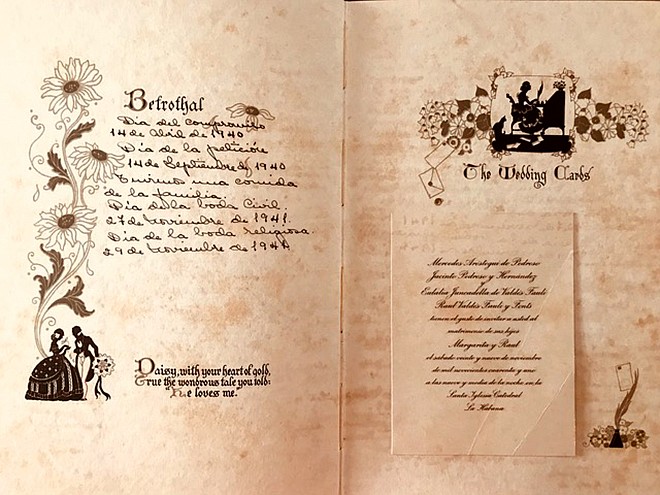MIAMI-Thousands of Cubans lost their valuables when they fled the Castro revolution. Decades later, those objects are turning up in Miami-for a high price.
The parents of Jose Valdes-Fauli, members of one of Cuba's most powerful families, left the island in 1960 believing they would be back soon. They left behind homes and valuable items quickly confiscated by the Castro revolution.
Nearly 60 years later, a wedding album handwritten by his mother, Margarita Pedroso y Arostegui, has turned up for sale in Miami by an antiquarian. And Valdes-Fauli faced a conundrum: Would he pay the $1,500 asking price?
"I didn't know that book existed," said Valdes-Fauli, who left Cuba when he was 8 years old and became a banker. His brother, Raul, is mayor of Coral Gables. "But all of that was stolen in Cuba when we left. Everything was left behind. They are trying to sell us our own things. It's very sad."
After overthrowing Fulgencio Batista in January of 1959, Fidel Castro quickly moved to punish those who had supported Batista and later everyone who fled the revolution's chaos. Resolution 454, issued in September of 1961, established that those who left the country, especially for the United States, were opponents of the government and should have their property confiscated unless they returned within 29 days.
"The revolutionary government has been taking notice that people who leave the national territory abandon their properties, such as movable and immovable assets, leaving them in the hands of relatives, friends or front-men, with the deliberate intention of violating the directives of the revolution," the resolution said.
Those who commit this "crime," the document noted, were regarded as "elements who oppose the people's principles and guidelines of the Socialist Revolution."
"If they don't return, it will be ruled that they abandon the national territory permanently, and as a consequence the government will decide on the allocation of movable and immovable assets and other valuables owned by those people," it added.
The resolution also established the requirement of an exit permit for anyone traveling abroad. That requirement was made permanent under Law 989, issued in December of 1961 and effective until January of 2013.
Using those laws, the government seized homes, furniture, jewelry, paintings and everything else the Cubans were leaving behind, including intimate possessions such as the wedding album of Margarita Pedroso y Arostegui and Raul Valdes-Fauli y Juncadella.
Many of those items were later sold by the government at auctions. The Valdes-Fauli home in Havana's wealthy Vedado neighborhood was then used by the government as a meeting place for political organizations and later turned into a daycare center. In 2015, Valdes-Fauli also denounced that the tomb of his grandfather, Jacinto Pedroso, in Havana's Colon Cemetery, was sold illegally.
"We did not abandon our home. We came here thinking we would be here a short time, that the United States was not going to allow communism so close by," Valdes-Fauli said. After the failed Bay of Pigs invasion to topple the Castro government, he added, "my parents realized we were staying here."
Aside from seizing the "abandoned" properties, "the communists nationalized U.S. companies, expropriated Cuban companies but never paid any compensation except in very limited cases," said attorney Nicolas Gutierrez, who represents several Cuban families whose properties were seized in the 1960s.
During the Obama administration, Cuban and U.S. delegations met to discuss the properties confiscated from U.S. citizens, but the negotiations went nowhere.
But even as some Cuban families whose properties were expropriated are still waiting for compensation, many of those items have been turning up for sale abroad.
The wedding album, with gold-trimmed pages, includes details of the engagement, the bachelorette party, the 1941 wedding's trousseau and the honeymoon in the United States. It also includes a detailed inventory of the gifts received: a diamond watch, silver platters, pearls, furniture, and many checks.
Carlos Alberto Fleitas, an architect and photographer, said he learned that an antiquarian was selling the album and "in trying to do good," passed the information to the Valdes-Fauli family through a mutual friend. "The seller acquired the album in Havana 15 or 20 years ago," he said.
In an email to Valdes-Fauli, Fleitas said he was very happy "that someone in the family could have this beautiful family item. That's why I dared to contact you-the antiquarian never wanted to let this piece go unless someone from the family could rescue it."
The email added that the seller was asking for $1,500. Valdes-Fauli offered $300, which was rejected. Fleitas said he could not reveal the identity of the seller, who supposedly lives in the United States, because the seller wanted to keep it "private."
Fleitas, who won the Cintas fellowship for architecture in 2015 and said he has been collecting photos and Cuban memorabilia for 30 years, said the album is valuable "not because it comes from a prominent Cuban family." It is not a work of art confiscated by the government, he added, "but rather a sentimental, family object that was left behind, and someone was interested in saving it."
The album also has "historical" value because it contains the signatures of members of Cuba's high society invited to the wedding, he added.
Fleitas said Valdes-Fauli has shown "no interest at all" in acquiring the album. "If he was so interested, he would have bought it. I myself have been recovering items that belonged to my family," he said. "My family also suffered an expropriation of goods, and I am well aware of the unfair process."
Fleitas accused Valdes-Fauli of trying to "make news out of nothing. I have been made part of a long narrative that does not interest me. This is defamation. This is not my job. It was a favor. It didn't work out."
He insisted that he did not own the album, and that he had never even seen it. "Don't put me in that soap opera," he said.
"A situation like this requires a minimum of decency and common sense," said art collector Ramon Cernuda. "The album should be returned immediately to the family. There's no doubt it belongs to the family."
Cernuda, owner of the Cernuda Art gallery in Miami, said he has personally dealt with cases in which Cubans abroad have claimed ownership, as legitimate heirs, of artworks coming out of Cuba.
"When there are claims about the ownership of works of art, we must search for the truth," he said. "When the truth confirms that it belongs to the family, we have turned over the item to the family.
"My strategy in those cases is to put ethics and morality first, because the law can be blind sometimes," he added.
Lawyers contacted by el Nuevo Herald said that trying to establish a difference between confiscated and abandoned properties, in order to establish their ownership, can be legally uncertain because Cuba's definition of abandoned property is not internationally recognized.
"That's the Nazis' defense, which frustrated efforts to win justice for many years and has been used by communist governments but is not recognized in international law," said Jason Poblete, an expert on U.S. sanctions on Cuba who has represented clients whose properties were confiscated.
"In Germany, the Nazis intimidated Jewish businessmen, many of whom left or 'sold' their businesses for nothing. When there was a democratic change in Germany, those people were treated as if (their properties) had been confiscated without compensation," Gutierrez said.
"Valdes-Fauli can rightly claim that what (the properties) they left back there was not abandoned voluntarily. There were firing squads, a reign of terror," he said.
But the law can be "cloudy" on some aspects, Gutierrez added.
"In Anglo-Saxon law there are legal precedents that a person who finds lost property has not exactly an ownership title but a valid possession of sorts," he said.
"If the person spent some money taking (the wedding album) out of the country he has something of an argument to ask for payment, at least to cover for his expenses," Gutierrez said. "But because of principles, because of morals, it's a little shameless to sell the owner something that was stolen from him."
In this type of case, in which very valuable items like real estate, jewelry or works of art are not involved, the two parties usually agree to an out of court settlement, he added.
In the Cuba of the future, these questions about property and ownership must be discussed, Poblete said.
"In a transition process, these are questions that must be raised. What was done in 1959 must be studied," he said. "Sadly, what is happening now is a black market on Cuban art, for example. Very valuable pieces are being trafficked. This is part of a discussion that must take place when we talk about 'transitional justice.'"
Regardless of what happens, the wedding album remains out there. Fleitas said that after the Valdes-Fauli family showed "no interest" in buying it, the antiquarian sold it to someone outside the United States.




